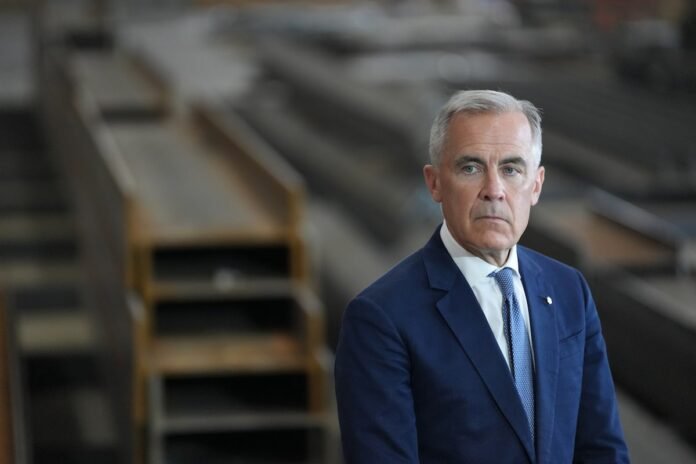Carney has lowered expectations for a U.S. trade deal, stating it will likely include some tariffs and an agreement may not be reached by Aug. 1.Chris Young/The Canadian Press
August is coming, and Mark Carney will have to learn how to manage the politics of concession.
The Prime Minister holds power because voters judged him most able to wrestle with U.S. President Donald Trump’s trade threats. How will they judge him when he gives ground?
Mr. Carney has been working to lower expectations before a theoretical Aug. 1 deadline for a Canada-U.S. deal. Two weeks ago, he indicated it will probably include some tariffs. Last week, he cast doubt on whether there will be a deal by Aug. 1.
Mr. Trump also suggested a deal might not come – but of course, that’s his way of stepping up pressure.
For Mr. Carney, the political danger isn’t just that Mr. Trump might not make a deal by the deadline.
His real political challenge is that signing on to a deal means making concessions – implicitly accepting damaging tariffs on some Canadian goods, such as steel, in order to mitigate the impact on others, such as autos or lumber.
Mr. Carney has exuded confidence since he entered politics, campaigning on the notion that he is the most able to deal with Mr. Trump – in particular, more capable than Conservative Leader Pierre Poilievre.
He didn’t actually promise to prevent Mr. Trump from imposing tariffs at all, but rather to strengthen the domestic Canadian economy and diversify trade to cope. But he certainly made it sound like he wasn’t going to swallow a bunch of concessions. And that’s what making a deal entails.
Signing onto a deal that spares Canada’s auto sector from disaster, for example, might also mean swallowing steep tariffs on steel – with Ottawa spending large sums on a bailout package to keep the sector afloat.
As it stands, Mr. Trump’s administration has used the pretext of national-security emergencies to apply tariffs to some Canadian sectors, such as steel, aluminum and autos, and is expected to target a few other areas, including pharmaceuticals and copper.
But so far, tariffs have not been applied across the board to other Canadian goods that comply with the 2018 United States-Mexico-Canada Agreement. Canada’s business community sees that as a sign that the agreement can be used to keep Canada-U.S. trade working smoothly, albeit no longer tariff-free. They want Mr. Carney to get a deal now and then work to improve things through a review of USMCA next year.
“This is the world we’re in for a while. And we need to think about the best way out of this,” Goldy Hyder, president of the Business Council of Canada, said in an interview. “We may need to swallow more than we want to, to get to the place where, I think, the off-ramp is.”
That won’t be an easy political manoeuvre for Mr. Carney. Other countries with narrower trade with the U.S. might seek to protect one key sector in a deal, but broad swaths of the Canadian and Mexican economies rely on U.S. trade.
While Mr. Trump insists he wants to impose tariffs in targeted sectors, there could be ways to avoid them in some.
The two countries could agree on a softwood-lumber quota to avoid tariffs. In the auto sector, Canada might agree to higher requirements for U.S. content and North American content in vehicles.
But Mr. Trump is unlikely to make any deal soon that will lift the steep tariffs on Canadian and other foreign steel – now at 50 per cent. Canada has already placed its own protective tariffs on steel.
And once Mr. Carney makes any deal, the politics of dealing with Mr. Trump’s threats will change dramatically. It will certainly require making concessions.
That would transform Mr. Carney from a Prime Minister who promises he won’t accept a bad deal to a politician who has to defend its disappointments.
He can promise that nation-building projects will boost the economy, but that won’t lead to orders for Canadian steel for years. In the meantime, there will be added pressure to add industry bailouts to a ballooning deficits.
And Mr. Carney doesn’t have a free hand to wait. Business leaders are screaming for a deal to reduce uncertainty for investors. Once he makes it, Mr. Carney’s political challenge will defending the concessions he accepted.






